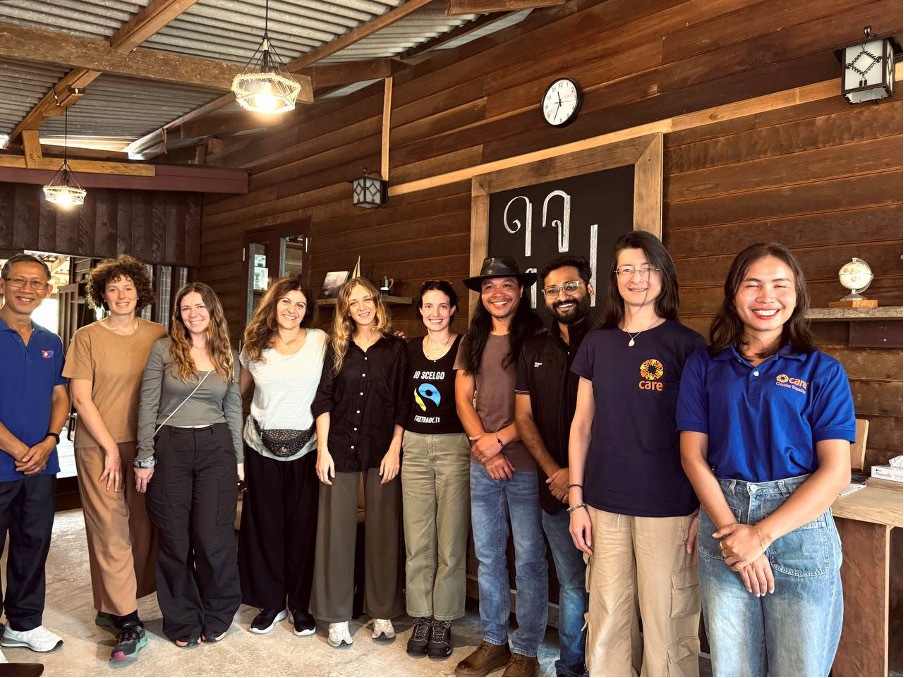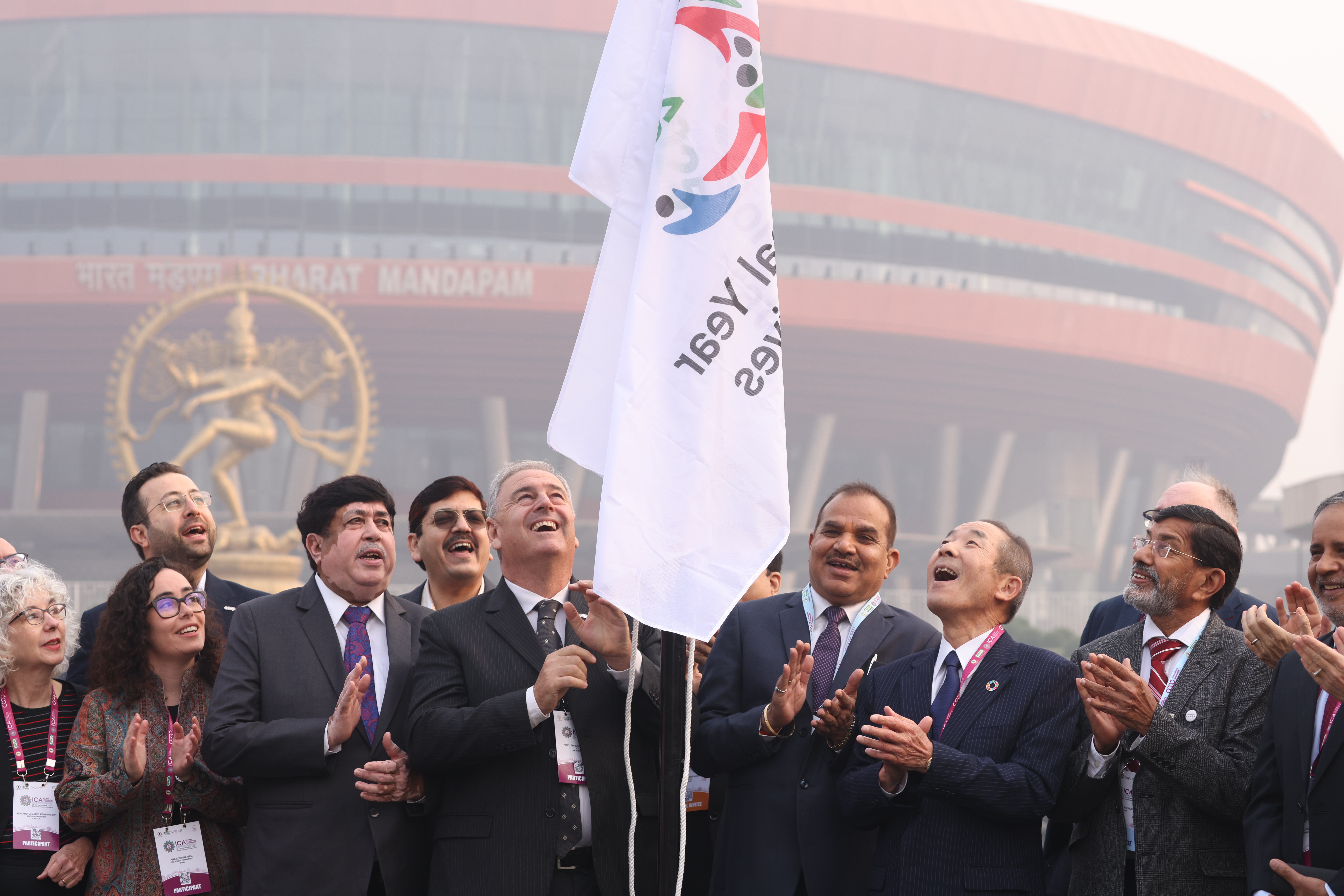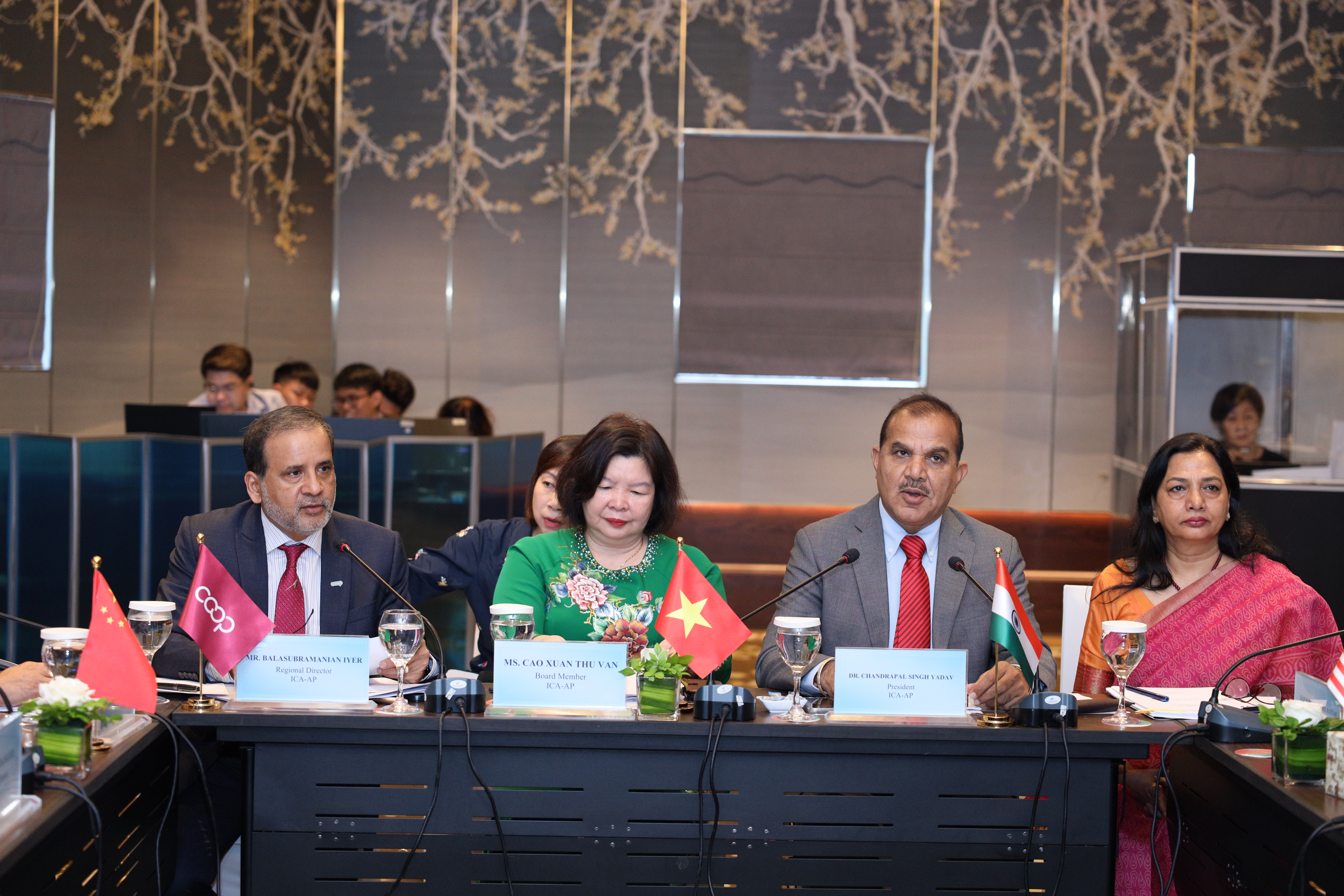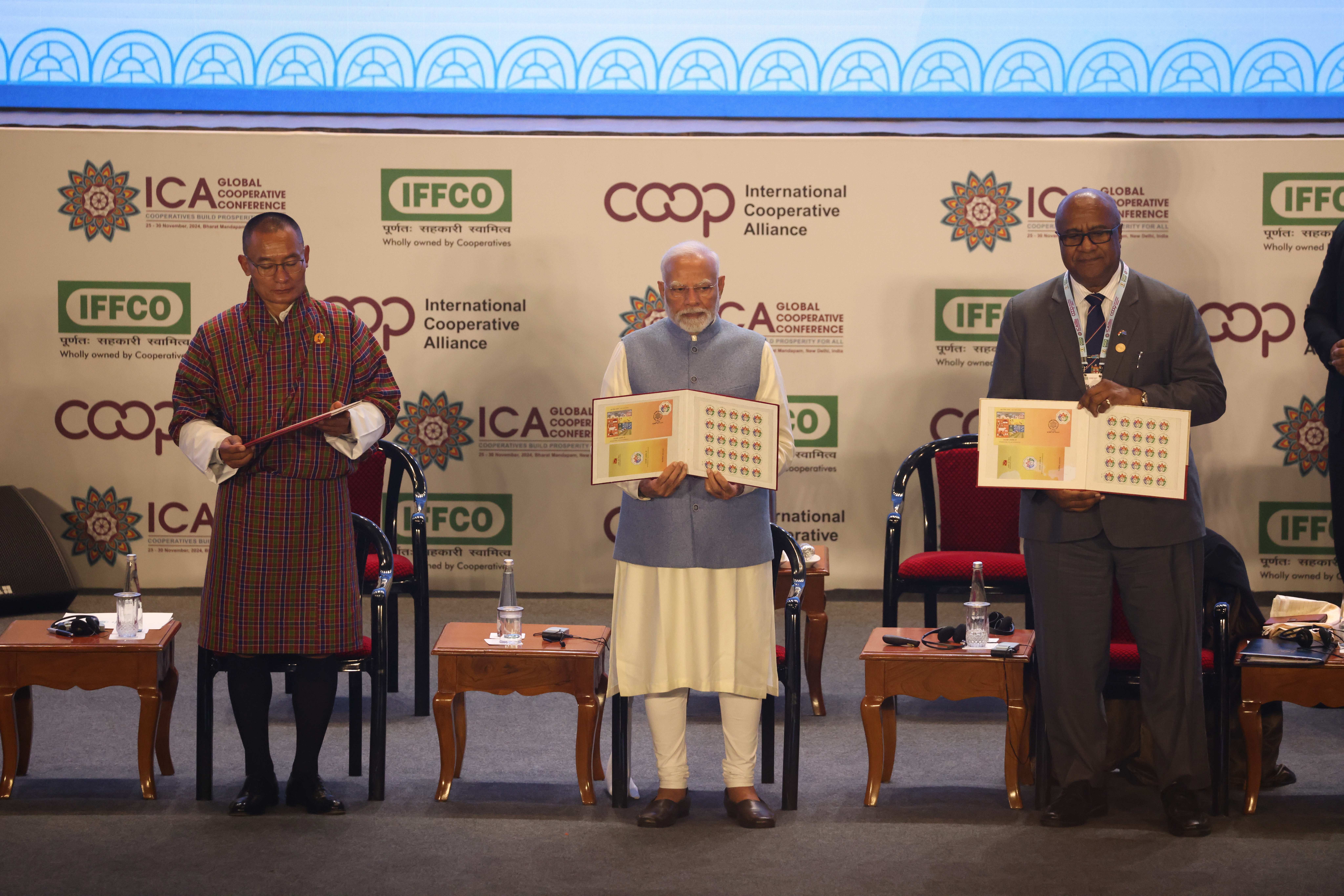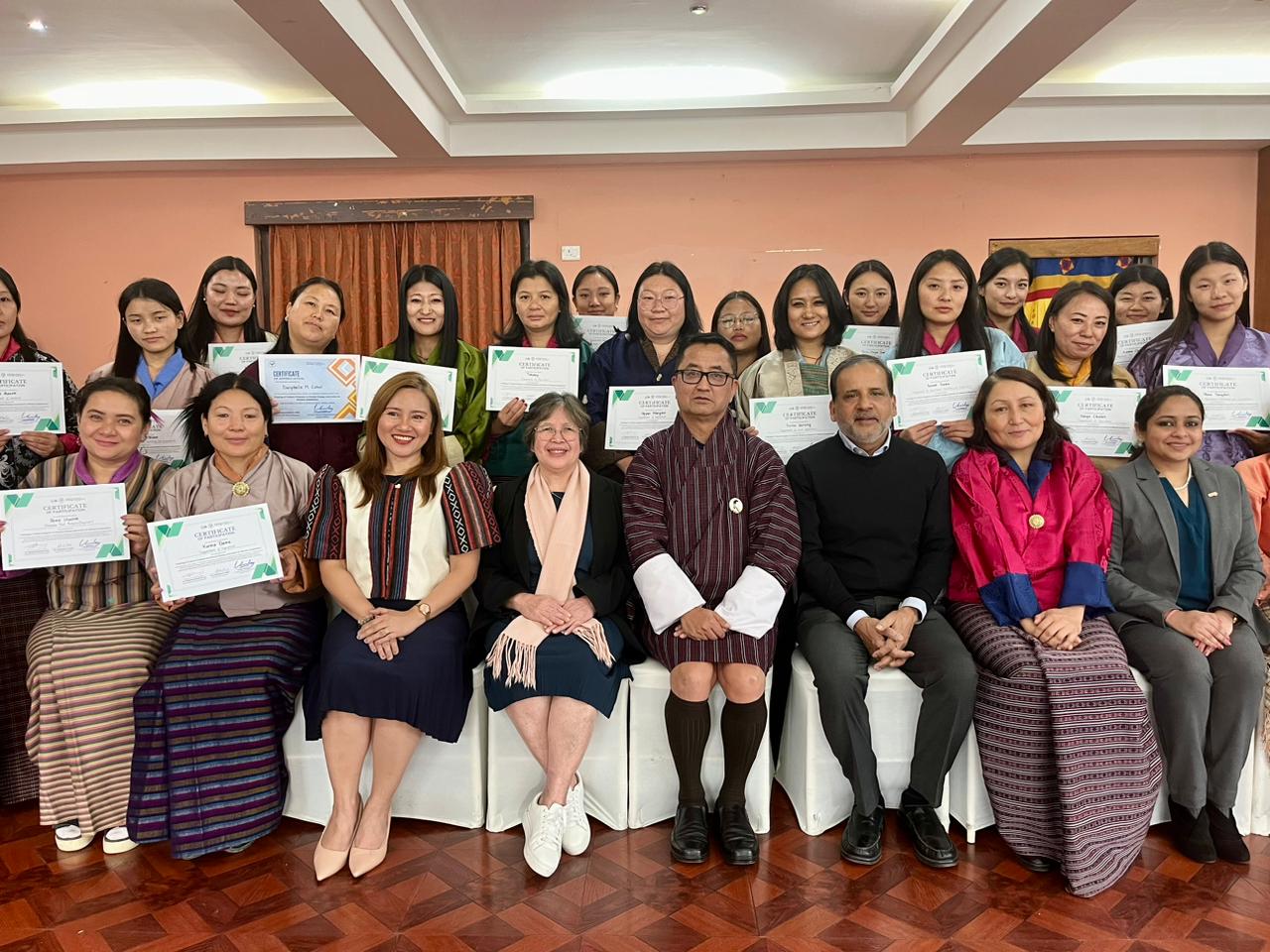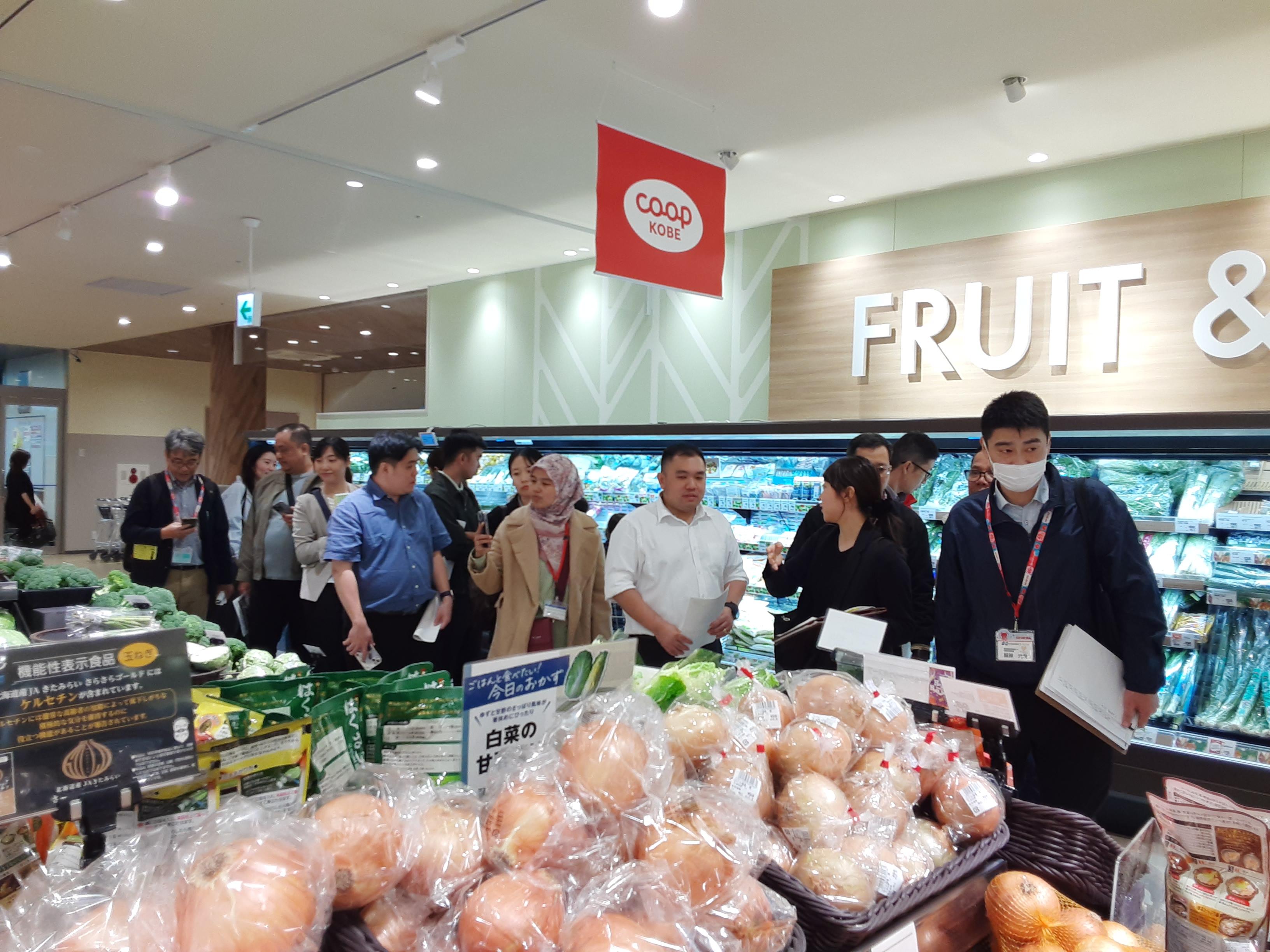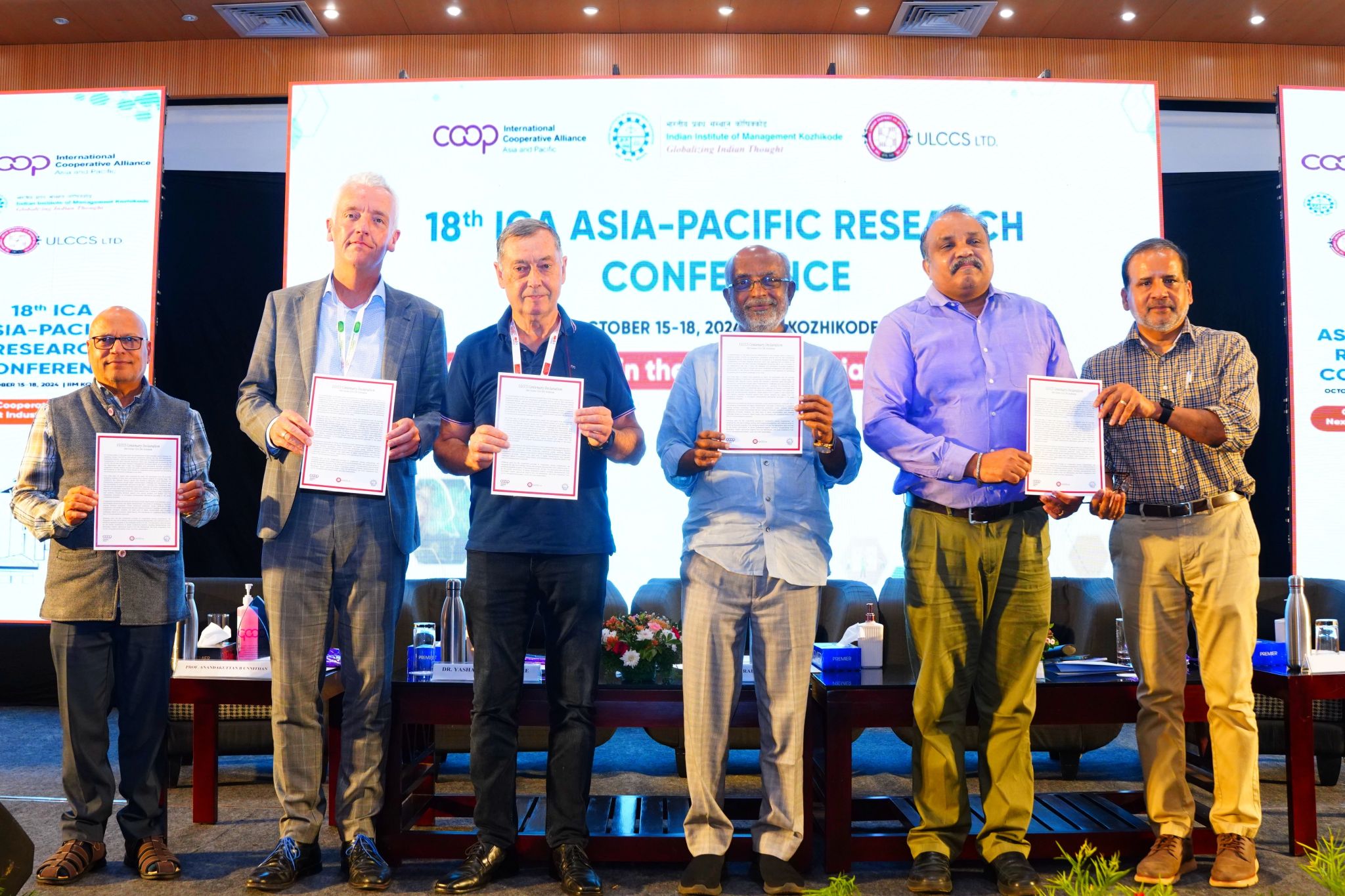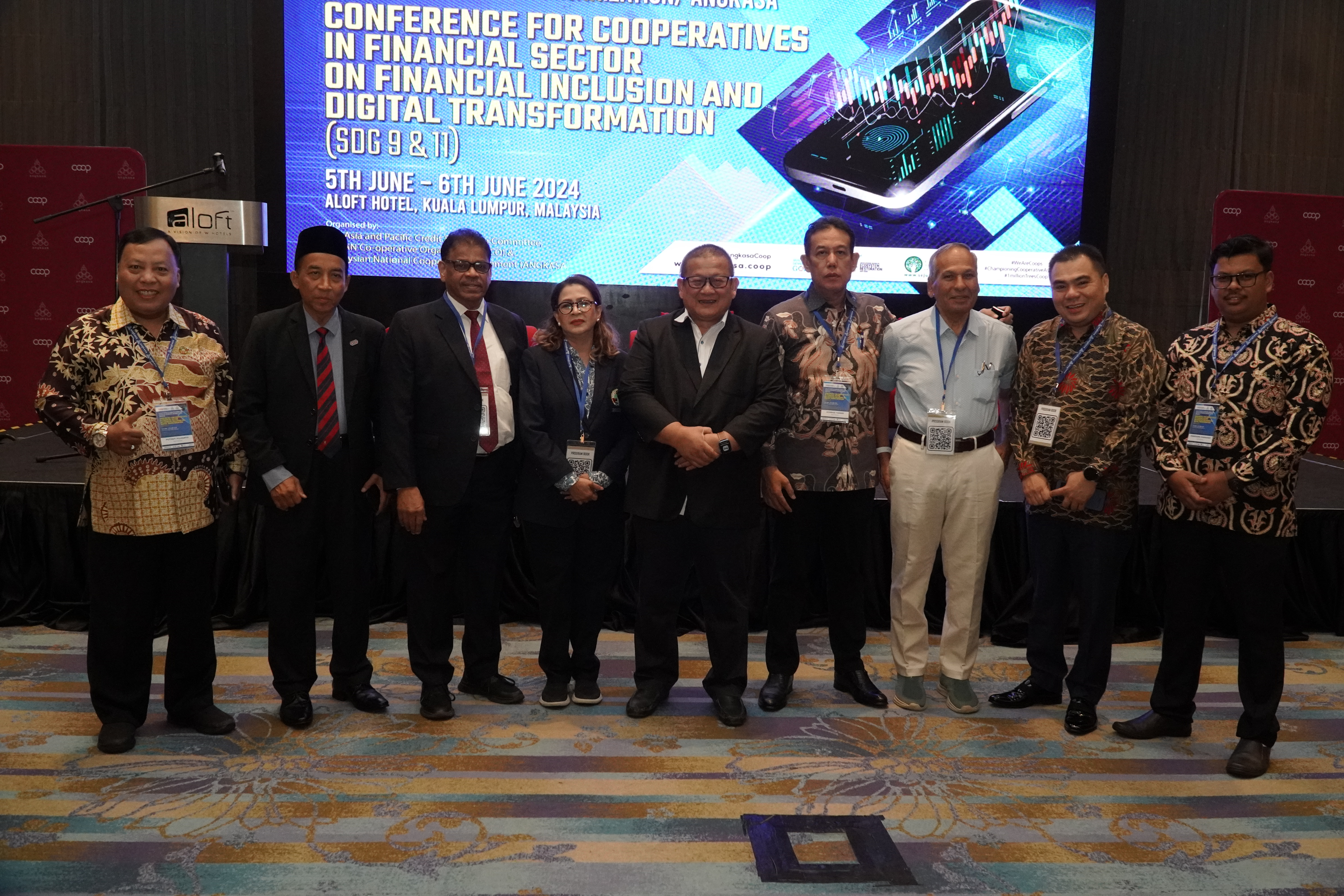ICA-AP continued to strengthen its international partnerships and expand capacity-building efforts to empower cooperatives across the Asia-Pacific region. The second phase of the ICA-EU partnership marked a major milestone, reinforcing the role of cooperatives as key actors in achieving the SDGs. The ICA-MAFF training programs and various other cooperative development projects equipped cooperatives with the tools, knowledge, and networks necessary to drive sustainable growth.
ICA-EU Financial Framework Partnership Agreement (FFPA) Phase 2
In April 2024, the ICA and the European Commission’s Directorate General International Partnerships (DG INTPA) signed a second Financial Framework Partnership Agreement (FFPA) on « Cooperatives: People-Centered Businesses for Sustainable, Democratic, and Inclusive Development » (or #coops4dev🌍). It builds on the successful Phase 1 partnership and creates more opportunities for the regions. To learn more about the work and activities of ICA-AP in FFPA 1, read our project report.
Phase 2 aims to contribute to a strong cooperative movement that supports the achievement of the SDGs by 2030. The program focuses on five key objectives: enhancing knowledge sharing and capacity building, strengthening cooperative models through research (mapping and legal analysis), promoting advocacy and partnerships, improving communication and visibility, and establishing effective project management systems.
The ICA Global office, along with its four regional offices - Africa, Americas, Asia and Pacific, and Europe, and ICA members are implementing the program to become strong actors at national, regional, and global levels for sustainable and inclusive growth worldwide. The teams from different ICA offices gathered in Brussels from 17 to 20 September for a kickoff workshop to prepare staff for the program duration. The staff were introduced to the program proposal and its various work streams. This was followed by dedicated sessions on presentations from FPA1, financial aspects, monitoring and evaluation aspects, joint activities, team-building activities, and planning for the first year of implementation and the IYC 2025. The participants also visited the EU Parliamentarian and museum.
Key project updates:
Study on Government-Cooperative Partnerships
As part of the 11th APCMC, ICA-AP commissioned a study to assess government support for cooperatives and identify opportunities to strengthen partnerships. Led by Dr. Yashvantha Dongre, the research analyzed legal and institutional frameworks across 10 countries, including India, Japan, Jordan, Malaysia, Nepal, and the Republic of Korea. The study highlighted significant differences in government engagement, with some countries having strong legal support while others faced challenges in cooperative development. Key success factors included fiscal incentives, human resources, and financial contributions, alongside stakeholder consultation and clear partnership guidelines. The findings emphasize the crucial role of government-cooperative collaboration in fostering sustainable growth.
The ICA-EU program team coordinated the study and published a report titled « Promoting Partnerships Between the State & Cooperatives: Comparative Perspectives from Select Countries of the Asia-Pacific Region. »
Engagement at the Aflatoun Asia Regional Meeting 2024
The ICA-AP regional office participated in its civil society partner Aflatoun International’s Asia Regional Meeting 2024, held from 24 to 28 June in Cebu, Philippines, hosted by NATCCO. Representing ICA-AP, Ms. Monalisa Kashyap, ICA-EU Program Coordinator, and Advocacy Officer, presented on "Youth in Cooperative Development." The five-day event gathered stakeholders from Aflatoun’s member countries, board members, and cooperators from the Philippines to exchange ideas and strategies for enhancing social and financial education. Key sessions covered topics such as climate change education, youth entrepreneurship, and digital learning. ICA-AP contributed insights during a dedicated breakout session on the Youth Committee, where best practices and experiences from across Asia-Pacific were shared.
Strategic Dialogue on Cooperative Development for Rural and Agrifood Systems Transformation in the Near East and North African Region
On 28 October, ICA-AP, in collaboration with FAOs Near East and North African Region Office (FAO NENA), and the ICA Africa, hosted a virtual Strategic Dialogue on Cooperative Development for Rural and Agrifood Systems Transformation in the Near East and North African (NENA) region under the ICA-EU FFPA 2 initiative.
The dialogue emphasized the vital role cooperatives play in transforming rural economies and ensuring food security. Keynote speaker Mr. Abdel Fattah Al-Shalabi from the Jordan Cooperative Corporation highlighted the impact of agricultural cooperatives on national strategies. Experts from FAO, Lebanon’s Ministry of Agriculture, Maghrebian and North African Farmers Union (UMNAGRI), Alliance Africa Agricultural Cooperative Organisation (AAACO), and International Cooperative Agricultural Organisation (ICAO) shared success stories and discussed enabling environments for cooperative growth. ICA-AP’s Ms. Kashyap presented research on the importance of policy and legal frameworks in strengthening agricultural cooperatives. The dialogue underscored the need for cross-border learning, unified strategies, and policy reforms to address shared challenges like climate change, food security, and economic inequality.
Asia Pacific Cooperative Development Platform (APCDP) Introductory Webinar + Physical Meeting
The Asia Pacific Cooperative Development Platform (APCDP) is an initiative to enhance collaboration and knowledge exchange among cooperative development organizations (CDOs) engaged in international cooperation and development.
The APCDP aims to facilitate knowledge exchange, map member activities, showcase best practices, and advocate for cooperative development. The team organized an introductory webinar on 4 September with representatives from international development organizations like DGRV, WeEffect, Agriterra, and Halièus joined along with ICA-AP members ACFSMC, NCUI, NACF, ANGKASA, and the JCCU. Further, the APCDP members met on 28 November at the ICA Global Conference in New Delhi, to brainstorm strategies to strengthen the platform. Key outcomes included: onboarding members onto the Mapping International Cooperative Development Programs (MiCDP) platform, featuring them in the ICA-AP monthly newsletter and on social media, exploring a dedicated section on the ICA-AP website, and conducting a member assessment to identify areas for collaboration. The APCDP is set to play a key role in strengthening cooperative development efforts across the region.
ICA-EU Virtual Capacity-Building Training on ‘Cooperative Governance, Challenges, and Solutions’ and ‘Principles of Good Governance’
In June 2024, ICA-AP conducted a needs assessment survey that revealed 36% of its members prioritized training on Good Governance and Leadership. In response, ICA-AP launched the online training program Empowered Leadership, Thriving Cooperatives: Strengthening Governance for a Better Tomorrow under the ICA-EU Financial Framework Partnership Agreement (FFPA2). The program aims to equip cooperative leaders with skills to enhance governance, promote sustainable business models, and drive growth.
The first session, on 18 November, was led by Access Livelihoods, an AIM-NITI Aayog-recognized Established Incubation Center (EIC) and recipient of the National Startup Award for Best Incubator in India. The session focused on key areas, including principles of cooperative governance (John Carver’s Policy Governance Principles), unique characteristics of cooperatives, governance structures, common governance challenges and their solutions, and the future direction of cooperatives. A total of 21 participants representing 18 member organizations actively participated in the program, enhancing their understanding of cooperative governance and its application to real-world scenarios.
The second session, on 16 December, focused on principles of good governance. Facilitated by Australia’s Business Council of Cooperatives and Mutuals (BCCM), it provided further insights into governance best practices. It engaged participants from Iran, Bhutan, Malaysia, Nepal, Cambodia, the Philippines, and Kiribati, focusing on governance principles from an Australian perspective. The session covered key topics such as the board’s role in strategy and policy-making, addressing common cooperative challenges, and ensuring member value creation. Case studies from the Capricorn Society, Yenda Producers Co-op, and The Co-op Bank (UK) illustrated effective governance practices, including the use of a board skills matrix, self-assessment processes, and technology in governance. The session highlighted the importance of member-centric governance and practical strategies to enhance cooperative effectiveness.
ICA-MAFF (Japan) Training Program
The Ministry of Agriculture, Forestry and Fisheries (MAFF) of the Government of Japan has collaborated with the International Cooperative Alliance through its Asia-Pacific Regional Office (ICA-AP) to implement the Capacity Building Project for Agricultural Cooperative Sector in Asia and Africa (CBC Project in AA). In each financial year, three training courses focused on women cooperators, African countries, and leadership development are conducted along with a follow-up module.
In 2024, ICA-AP conducted a total of four training courses across two financial years (2023-24 and 2024-25) and a follow-up module in Africa along with its collaborators.
The first course on « Capacity Building of Farmers to Respond to Challenges through Development of Agricultural Cooperatives in FY-2023 » was held in Japan from 21 January to 03 February 2024. It was organized in collaboration with the Institute for the Development of Agricultural Cooperation in Asia (IDACA) and the World Farmers’ Organisation (WFO). Five participants from Ghana, Rwanda, Zimbabwe, Kenya, and Uganda in Africa and a WFO representative as observer visited Japan to build their capacities and learn how farmers are organized into cooperatives in Japan and how to establish and strengthen agricultural businesses. Before starting the on-site training, participants completed home country assignments, watched pre-recorded videos on Japanese Agricultural Cooperatives (JAs) and drafted action plans for their organizations. During the two-week training in Japan, they visited JAs in Chiba Prefecture and the Zen-Noh Research & Development Center to learn about JA operations, farm support, industrialization, marketing, quality assurance, organic farming, and business management. Classroom sessions covered topics like Good Agricultural Practices (GAP) Certification, technical management, Smallholder Horticulture Empowerment and Promotion (SHEP), and rural financing. The training ended with participants presenting their plans and receiving certificates.
Another course on « The Promotion of Sustainable Agriculture and Improvement of Farmer’s Income through Development of Agricultural Cooperatives in FY-2023" began on 1 March 2024 in Bangkok, Thailand. The four-week-long course, from 1 to 29 March 2024, with additional home country assignments before the training, was guided by a shared purpose to promote sustainable agriculture and enhance farmer’s income. Part 1 of the course, from 1 to 15 March, was hosted by the Cooperative League of Thailand (CLT) in Thailand, followed by Part 2, from 16 to 21 March, hosted by IDACA in Japan. The course brought together a diverse cohort of seven participants from Cambodia, Bhutan, the Philippines, Thailand, Indonesia, and Fiji. In Thailand, participants attended sessions on the history of Thai cooperatives, governance and management of agricultural cooperatives, business development, and project planning. They also visited agricultural and credit cooperatives to gain hands-on insights. In Japan, they learned about the structure and operations of agricultural cooperatives (JAs), explored case studies on marketing and business strategies, organic farming, and innovative concepts like 6th Industrialization, and studied JA’s education and public relations activities. This dual-location approach ensured a holistic understanding of cooperative development practices, enriched by both regional and international perspectives.
ICA-MAFF (Japan) Follow-Up Program in Africa
The training courses funded by MAFF, Government of Japan, have a significant component of follow-up with ex-participants through visits and surveys. It provides an overview of the participants’ progress in implementing their action plans, highlights the challenges they have faced, and offers insights to plan future activities. In early April 2024, Mr. Balasubramanian Iyer, Regional Director of ICA-AP along with Mr. Hirofumi Kobayashi, Executive Director and Ms. Oshita Eiko from IDACA, Japan visited Nairobi on a follow-up mission. These participants had previously attended the training programs, an initiative designed to enhance food security and promote sustainable agricultural practices across the continent. Africa has been a priority region for Japan in its global strategy to foster agricultural development. By visiting agriculture cooperatives and farmers’ organizations in Japan, India, and Thailand, the African participants get to witness first-hand, the transformative power of these people-centered organizations. During the visit, the ICA-AP-IDACA team held in-depth discussions on the progress of action plans with participants from Kenya, Uganda, Rwanda, and Mauritius. These interactions provided valuable insights into the practical challenges and successes encountered in implementing these plans.
The training course on "Promotion of Sustainable Agriculture and Improvement of Farmer’s Income through Development of Agricultural Cooperatives in FY-2024 » was held in Thailand and Japan between 31 July and 28 August 2024. It aimed to review and study the roles of farmers’ organizations and find new roles to meet « sustainable agriculture. » Module 1 was in collaboration with CLT in Bangkok and Module 2 was in collaboration with IDACA in Tokyo (Japan). Seven participants from seven countries (Bangladesh, Bhutan, Cambodia, Fiji, Indonesia, Philippines, and Thailand) participated in the classroom sessions and study visits in and around Bangkok and Tokyo. The course sessions remained mostly the same around agricultural development in the two countries. Given the experience gained through classroom lectures, new field study visits in Thailand and Japan, group discussions, and based on their work environment, the participants developed brief outlines of their Action Plans, which they presented on the concluding day of the training course.
The training course on « Capacity Building of Farmers to Respond to Challenges through Development of Agricultural Cooperatives in FY-2024 » was held in Japan from 13 to 26 October 2024 with IDACA. A total of six participants from Cameroon, Eswatini, Malawi, Mauritius, and Tanzania were nominated by the ICA Africa Office and the WFO. Following the same structure, the participants visited JAs and individual farmers in Chiba, Saitama, and Tokyo prefectures and the Zen-Noh Research & Development Center to learn about JA operations, farm support, industrialization, marketing, quality assurance, organic farming, and business management. Classroom sessions covered topics of Smallholder Horticulture Empowerment and Promotion (SHEP).
The lessons learned in Japan left a deep impression on the participants for the implementation of action plans and agricultural development in their respective countries.
“The training program was well coordinated, organized, and systematic. The diversified learning platforms, including the training materials, study visits, and lectures, are easily understandable. We gained a lot of valuable ideas, insightful knowledge, experiences, and exploration from this program on the cooperative movement in Thailand towards successful and sustainable business ventures.” – Mr. Pema Wangchuk from Bhutan
“The opportunity to learn about various agricultural practices and techniques provided a wealth of knowledge that I can apply directly to our cooperative. I appreciated the hands-on approach and the opportunity to see successful farming models. The training not only broadened my understanding but also inspired new ideas that I want to implement. The training has equipped me with the skills and knowledge needed to drive innovation and success in our cooperative. I am very grateful for the hospitality and support provided by IDACA staff in Japan, which made this learning journey smooth and memorable.” – Mr. Napaphat Jaroenchotworakun, a participant from Thailand.
Additional Training and Development Initiatives
Other than implementing capacity-building projects directly, ICA-AP also engages in such initiatives through its sectoral committees and in collaboration with its international partners. Some of these initiatives this year included:
Regional Workshop on Coop-2-Coop Collaboration: Uniting Through Trade and Consumer Networks
The regional workshop was held by the ICA-AP Committee on Consumer Cooperation, Committee on Trade & Business, and Saigon Co-op in Vietnam. It marked a significant milestone in fostering cooperative practices and trade networks within the Asia-Pacific region. Held from 20 to 24 May in Ho Chi Minh, Vietnam, the event centered on the theme "Coop-2-Coop Collaboration: Uniting Through Trade and Consumer Networks" and was attended by 30 participants from 9 countries. Throughout the workshop, participants engaged in a series of sessions to learn best practices of cooperative trade, identifying and overcoming challenges, studying successful business models, and establishing an international cooperative network. The diverse range of topics included successful models of Co-op to Co-op (C-2-C) trade, strategies employed by Saigon Co-op for success, challenges associated with C-2-C trade, policies contributing to the success of consumer cooperatives, and opportunities for cross-border partnerships.
Participants visited various Saigon Co.op stores, gaining practical insights into cooperative practices and retail operations. They also engaged in a cultural and historical excursion to the renowned Cu Chi tunnels, a significant historical site located in Ho Chi Minh City. The regional workshop in Vietnam was a pivotal moment in advancing cooperative practices and fostering regional collaboration within the Asia-Pacific retail sector.
"Youth in Cooperatives as Key Drivers of Digital Transformation in Local Communities – YOU COOL" Project
On September 18, 2024, the "YOU COOL" project was launched in Hanoi, Vietnam, to empower youth in cooperatives as leaders of digital transformation in local communities. Supported by the EU, the three-year project is a collaboration between the Vietnam Cooperative Alliance (VCA) and Haliéus, with support from ICA-AP, the ILO, Agriterra, and others. It focuses on improving digital skills, promoting cooperative governance among youth, and driving the digitization of cooperatives, with a special emphasis on the coffee supply chain. The launch event, attended by ICA-AP and key stakeholders, highlighted the project’s potential to benefit 9.4 million cooperative members by enhancing digital access and innovation.
ICA-AP Training Program for Managers of Consumer/ Retail Coops
The ICA-AP Consumer Committee and JCCU held the 2024 Training Program for Managers of Consumer and Retail Coops in Japan from 4 to 17 November. Eight managers from Singapore, Vietnam, Korea, Malaysia, and the Philippines took part, learning from lectures and visiting various facilities like retail stores, food factories, and logistics centers of Japanese consumer cooperatives.
The program, running since 1991 (with a break during the pandemic), focused on tackling challenges such as serving aging populations, adopting IT, achieving SDGs, attracting younger members, and standing out from competitors. Participants explored initiatives like eco-friendly practices, digital transformation, and innovative home delivery systems. They also discovered unique approaches, such as donating part of sales to social causes and using apps to connect members, staff, and manufacturers. The program ended with presentations where participants shared how they plan to use these insights to improve their coops. They left inspired by the Japanese coops’ commitment to community, sustainability, and innovation.
SuperWE Coffee Project Steering Committee & Field Mission in Lao PDR
From 4-8 November, ICA-AP joined a field mission and Steering Committee meeting for the Sustainable Production and Ethnic Responsible and Women Empowered Coffee Value Chain Project (SuPER WE Coffee project) in Sekong Province, Lao PDR. This initiative focuses on sustainable coffee production, ethical value chains, and empowering women in rural communities. The team visited coffee-producing villages in Dak Cheung district, engaging directly with cooperative members who shared their experiences and challenges. Highlights included visits to Jhai Café and the Cooperative for Sustainable Eco Coffee, showcasing sustainable practices and efforts to improve coffee quality and market access. At the Steering Committee meeting in Lamarm, participants, including local officials and EU representatives, brainstormed ideas for scaling cooperatives, strengthening governance, and aligning with international sustainability standards like the EU Deforestation Regulation 2023 (EUDR). The mission wrapped up with a collaborative roadmap to empower coffee producers and foster sustainable livelihoods, reaffirming ICA-AP’s dedication to supporting rural communities and advancing ethical agriculture in the Asia-Pacific region.
As we look ahead, our focus will be on expanding these initiatives to address emerging challenges and opportunities in the cooperative sector. Under the ICA-EU FPA2, advocacy, research, visibility, and international development will be scaled up to strengthen cooperatives’ role in achieving the SDGs. The ICA-MAFF training programs will continue to empower agricultural cooperatives with global best practices and hands-on learning experiences.
To cite this part
ICA-AP, « Strengthening International Partnerships & Capacity Building », in ICA-AP Annual Activity Report 2024, New Delhi, 2024, online
